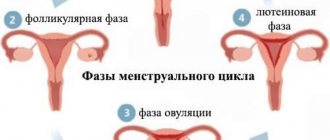You found out that you are pregnant. This is great news for many expectant mothers. A child begins and completes its development in the mother's womb over a period of nine months. This entire period can be divided into two periods: embryonic, which lasts 8 weeks after conception, and fetal.
On an intuitive level, every woman will feel that changes have occurred in her body, although the sensations are still barely noticeable. If you are estimated to be 1 week pregnant, this can only be determined using an ultrasound.
When does conception occur?
Conception can only occur in the middle of a woman's cycle, which usually lasts from 25 to 35 days. If you had unprotected intercourse during this time, then there is a high probability that conception will occur. The introduction of a fertilized egg into the wall of the uterus usually occurs on the 5th or 6th day after conception , and only from this moment can the first signs of pregnancy occur.
This means that any signs immediately after sexual intercourse or for several days after it are physiologically excluded. At this moment, contact between the mother’s body and the fertilized egg simply does not exist.
When should I see a gynecologist?
Immediately after conception, there are no specific signs of pregnancy, although a colossal restructuring occurs in the woman’s body at this time. Usually, you can determine the onset of pregnancy by your feelings only after a delay in menstruation.
Doctors register a woman with an antenatal clinic starting from the second month of pregnancy. When determining the obstetric period, the starting point is not the day of conception, but the day of the beginning of the last menstruation before the onset of pregnancy.
No one will tell you the exact date. Typically, it ranges from two to three weeks. Hormonal changes begin in the body of a pregnant woman. It is during this period that the fetus is formed. Unnecessary intervention by doctors can cause a miscarriage, so you should not visit a doctor before one month of pregnancy.
Pain in the lower abdomen
Starting from the 4th week, i.e. a week after conception, a pregnant woman may feel pain in the lower abdomen, and some women experience back pain instead. The age of the embryo, the unborn baby, is only one week. Many women do not even suspect they are pregnant at this time, and possible implantation bleeding is mistaken for menstruation. Since such pain is often spasmodic, women think that it is associated with the beginning of a new cycle, and not with the onset of pregnancy. Relaxation and warm (not hot!) heating pads help against these pains.
Changes in a woman’s breasts are a sure sign of pregnancy
In addition to the pain that appears in the first stages of pregnancy, there are several symptoms that unmistakably indicate the birth of a new life. If a woman carefully observes all changes in the body, she will be able to accurately recognize pregnancy.
The breasts are already preparing for lactation from the first days, and notify about this with painful sensations. She becomes rougher, veins begin to show. The nipples become especially sensitive; even a light touch can cause discomfort. For this reason, you should not wear rough clothes; it is better to give preference to natural soft fabrics that do not cause irritation.
Often pregnant women notice that the areolas increase significantly, and already in the very first weeks after conception. Cones in their habitats may also change in size, but this is also individual.
The last symptom by which the breast notifies you of pregnancy is the release of colostrum or yellowish fluid. Since their number is quite scarce, these signs are usually noticed very rarely.
Fatigue
Many women begin to feel more tired as they get pregnant. This is due to an increase in the level of the hormone progesterone, which has a sedative effect on a pregnant woman. Progesterone is produced in the mother's ovary by the corpus luteum, which remains after ovulation at the site of the follicle. This hormone will be produced until about 10-11 weeks of pregnancy and is necessary to support pregnancy and prevent miscarriage.
In addition, fatigue also arises from the fact that already in the very early stages a woman’s body is working “for two”. A lot of energy is required not only by the development of the embryo, but also by the growth of the placenta, which will provide the baby with everything vital throughout pregnancy.
Symptoms of pregnancy in the first week
In fact, it is difficult to talk about any diagnosis at such an early stage. After all, we have already figured out that on the seventh day after fertilization of the egg, only the implantation process occurs, which will be completed on the 10th day after fertilization. Still, there are some signs of pregnancy even in such early stages of pregnancy.
First of all, from the list of pregnancy symptoms in the first week after conception, I would like to highlight basal body temperature. Any woman planning her pregnancy has already heard about this from her obstetrician-gynecologist and put it into practice.
Basal temperature of certain values is one of the early signs of pregnancy
Basal body temperature is an indicator of body temperature that is measured after proper rest and a long-term state of rest.
This indicator is very effective in planning pregnancy and is widely used in practice, and also has a positive result.
The main thing is to follow some principles and rules for using this method. Rules for measuring basal body temperature:
- Temperature must be measured rectally;
- use a mercury thermometer for measurements (it has the smallest error);
- the duration of temperature measurement should be no less than five minutes and no more than seven minutes;
- measure basal temperature immediately after waking up before performing any active actions (i.e. without getting out of bed);
- measurements should be taken at the same time, the best option according to physiology would be at 7 am, with an error of no more than half an hour (thus, it will be necessary to adhere to the daily routine);
- Before the measurement, the woman must sleep for at least 6 hours straight.
The main principle of measuring basal body temperature will be consistency and maintaining a schedule, which should contain at least three cycles in a row. Only in this way can dynamics be identified and will further simplify the task of early diagnosis of pregnancy.
If a woman used this method when planning a pregnancy, then it will not be difficult for her to detect pregnancy already in the first week after fertilization. The fact is that during the menstrual cycle, the basal temperature rises only once - on the day of ovulation; when the egg is fertilized, such a jump will be noticeable on the day of implantation. The easiest way would be to take previous charts for measuring basal body temperature and compare visually. Further, for most women, the temperature measured on the day of implantation will be constant without significant fluctuations.
The second sign of pregnancy, which may appear in the first week after conception, is vaginal discharge. They may change their consistency and color. Thus, thick vaginal discharge will be a prerequisite for the formation of a plug, which, in turn, will protect the baby from external influences and the penetration of infections and unfavorable bacteria throughout pregnancy. Bloody discharge will appear during the insertion of a fertilized egg into the wall of the uterus, but provided that it is insignificant. If discharge of this nature still bothers you and is larger in volume than expected, you should urgently consult a doctor.
Changes in hormonal levels and absence of menstruation are the first bells that make a woman think about pregnancy
The third sign of successful fertilization of the egg after a week is a change in the woman’s hormonal levels. The most important event in a woman’s body is considered to be an increase in the hormone progesterone. It begins to increase in significant volumes immediately after the brain receives a signal about successful fertilization. It is this hormone that is responsible for the further development of the baby until the 14th week of pregnancy (or 16th week according to the obstetric method of calculating the term).
An increase in progesterone in the body of the expectant mother can negatively affect the digestive system. This hormone in large quantities disrupts intestinal motility and can cause constipation, and also has a negative effect on digestion in general and provokes nausea and sometimes vomiting in a woman expecting a child.
The nervous system of a pregnant woman also cannot resist changes of this nature. The woman becomes more irritable and feels frequent changes in her mood. Taste preferences may change, for example, “craving something salty”, the sense of smell will increase: your favorite perfume causes a feeling of disgust, etc.
Excessive emotionality can accompany the entire pregnancy
Another hormone that will indicate the development of life in the womb is human chorionic gonadotropin. Its rate grows exponentially right from the moment the egg is fertilized. You can get tested for this hormone at the antenatal clinic. Before taking the test, you must avoid eating for 6 hours, at best on an empty stomach. To detect an increase in hCG levels, blood sampling must be repeated approximately 3 times with an interval of two days.
Drowsiness is a common symptom of the first trimester
Another sign of pregnancy is increased fatigue and drowsiness. In the morning it is difficult to feel cheerful and sleepy. The woman understands that she gets tired with the same rhythm of life as before.
Decreased immunity
A painful condition and malaise sometimes appears as a result of fatigue, which in itself is already a sign of pregnancy. In addition, at the time of pregnancy, a woman’s immune system is usually weakened. The embryo is half a “foreign element” (including the father’s DNA), and the task of the immune system is to reject everything foreign. To prevent this from happening, under the influence of hormones, the immune system is weakened and allows the embryo to join the mother's body.
Change of taste preferences
Everyone is familiar with the well-known “salty craving.” In the very early stages, pregnant women may experience an increased appetite for salty, spicy, sweet, meat or unusual exotic food combinations, such as cheese with jam or potatoes with jam. And at the same time, there will be an aversion to coffee, cigarette smoke and certain foods. Moreover, sometimes just thinking about them is enough for a wave of toxicosis to roll over.
Why a change in taste preferences occurs is not yet completely clear to science, but some scientists believe that this is a brilliant move of nature that forces a pregnant woman to give up something that could harm the nascent life. Cornell professor of neurobiology Paul Sherman argues that changes in taste preferences and toxicosis are even beneficial, as they protect the fetus from substances harmful to it. During his research, the professor provided other evidence for his theory:
Quote
- Nausea and vomiting decrease after 18 weeks of pregnancy because by this time the fetus becomes less vulnerable to the effects of chemical substances.
- Women with very severe morning sickness have lower rates of spontaneous abortion than other pregnant women.
- Historically, intensely flavored meats and vegetables were likely to contain parasites, pathogens, and plant toxins; These products are usually dangerous to the fetus. Therefore, not only they, but also alcohol and cigarette smoke, which can also harm the fetus during the formation of organs, cause nausea.
- In peoples who consume more intensely flavored meats and vegetables, as well as alcohol, toxicosis is more common than in peoples who consume predominantly other foods.
Presumably, this reaction of the body can even prevent early miscarriages, says Paul Sherman.
In addition, pregnancy, especially at its earliest stage, radically changes a woman’s hormonal levels, and this in turn affects the senses of taste and smell.
Healthy course: changing your diet from the first weeks
A serious approach to pregnancy planning necessarily includes adjusting the daily menu. A varied, regular and nutritious diet should become a way of life for the next 1-1.5 years. At the same time, it is important not to “go all out” by starting to eat your favorite dishes in double quantities. An increased amount of calories can only be stored as excess weight, without benefit for the baby. Therefore, there is definitely no need to eat for two.
Even at the earliest stages, a woman’s diet should include:
- lean boiled and baked meat;
- sea and river fish;
- fresh seasonal fruits and vegetables;
- dairy and fermented milk products;
- cereal crops.
The amount of sugar and animal fats should be minimized, or better yet, gradually eliminated from a pregnant woman’s diet. The method of cooking also plays an important role: the gastrointestinal tract undergoes changes under the influence of hormones, so it is better to spare it and not eat spicy, smoked and fried foods.
Here's what a menu might look like for an expectant mother at 1 week of pregnancy:
| Eating | Food and drink options |
| First breakfast | Oatmeal with banana, yogurt, weak tea with lemon |
| Lunch | Baked apple with cottage cheese and raisins, dried fruit compote |
| Dinner | Salad of Chinese cabbage, fresh cucumbers and herbs, chicken noodle soup, cheese sandwich, tea |
| Afternoon snack | Toast with butter and jam, fruit juice or tea |
| Dinner | Baked fish fillet, mashed potatoes, vegetable salad, tea |
| Before bedtime | Kefir 1% or drinking yogurt, bread/biscuits |
Below are several simple and healthy recipes for a pregnant woman every day.
Omelette with cheese and spinach
Mix chopped spinach with two eggs, add a couple of spoons of sour cream (or light cream), and beat. Brown the mixture in butter under the lid for 5 minutes, then without the lid for 2 minutes. Before serving, sprinkle the hot omelette with grated mild cheese. Instead of spinach, you can use green onions or dill. A hearty and tasty breakfast thanks to the optimal content of proteins and carbohydrates will be an excellent start to the day for the expectant mother.
Liver pancakes with greens
Grind chicken liver (0.7 kg) using a blender along with onions and carrots. Add parsley, a pinch of salt and stir. Place the batter in portions on a heated frying pan with vegetable oil. Fry the pancakes on both sides for 3-5 minutes until cooked. Serve warm with sour cream. This healthy snack can be eaten as a separate dish (snack), or served with a side dish.
Milk shake “Pomegranate bracelet”
This delicious cocktail prevents anemia in a pregnant woman due to its record iron content. You need to mix half a glass of pomegranate juice with a glass of low-fat kefir in a blender. If desired, you can add chopped berries (blueberries, strawberries, blackberries) or banana to the cocktail. You need to drink chilled, in small sips, an hour before your main meal.
Bloody discharge from the genitals
In the very early stages of pregnancy, spotting may appear. They occur a few days after fertilization at the moment when implantation occurs, that is, the implantation of the embryo into the wall of the uterus. But this is not a mandatory sign of pregnancy or a guarantee that pregnancy has occurred.
If pregnancy is very desired, then any discharge should be discussed with your doctor as early as possible. Sometimes they occur due to a lack of the hormone progesterone and may indicate a threat of miscarriage. In this case, your doctor will do a blood test and prescribe medication at the appropriate dosage to support the pregnancy.
Baby development at 1 week of pregnancy
Considering that the period is 1 week, the pregnancy cannot actually be called complete, so there is no talk of an embryo yet. Only after 2-3 weeks will the doctor be able to establish that there is indeed a fertilized egg, it has successfully attached and a dome-shaped protrusion has formed on the wall of the uterus. In the meantime, the main sign of completed fertilization can be considered only a special phenomenon that occurs in 1/3 of cases - implantation bleeding. It manifests itself on days 5-7 from the moment of conception as a slightly spotting spotting.
Considering embryonic and obstetric calculations, there is no embryo as such in the mother’s womb. Cell division of the embryo begins, and it spends the first week of its existence on the road - slowly but surely moving into the uterus through the fallopian tubes. As soon as it reaches its goal, it will attach to one of the mucous walls, where very soon a connection with the mother will be formed in the form of an umbilical cord and a branched chorion.
Important! The little future man already has hereditary characteristics - from his mother and father. How and in what way this will manifest itself is still unclear, but already at the first ultrasound you will be able to get to know your baby better by taking a memorable photo from the screening. In the meantime, during this important period for pregnancy, a woman should beware of infections, worries, and devote more time to rest and sleep.
Early toxicosis
The most common and well-known sign of pregnancy is early toxicosis (nausea). It occurs early in pregnancy - usually between 6 and 12 weeks, but in some cases earlier. Most often, attacks of nausea occur in the morning, but for some women, toxicosis can also roll in like a wave throughout the day, regardless of food intake. In rare cases, nausea progresses to vomiting, but this happens very rarely and even less often in very early pregnancy.
Toxicosis itself is one of the very unpleasant signs of pregnancy, but its presence in the early stages can be considered a positive sign, since it indicates the presence of a healthy, stable pregnancy and a constant increase in the hCG hormone. It must be remembered that in the opposite case, the absence of toxicosis does not indicate the absence of pregnancy. Every woman is individual.
How can you tell if you are pregnant?
Nowadays, a special test is used to determine pregnancy. In the early stages, you should use an ultrasensitive test that reacts to the presence of a special hormone in the biological fluid (urine). You can purchase such a test at any pharmacy kiosk in the city. It is enough to open the test and drop a drop of urine on it, after 3-5 minutes you can evaluate the result.
If the test shows two lines, it means you are pregnant. If you are not sure, you can retest. To get an accurate result, it is best to use the test in the morning. It is during this period that a woman’s urine contains a high concentration of human chorionic gonadotropin, which means that the test is more likely to give an accurate result.
Note! You should not rely only on the test; a gynecologist can make an accurate conclusion that you are pregnant after an ultrasound examination and examination.
Frequent urge to urinate
Usually, right at the beginning, women notice that they need to go to the toilet much more often. The reason is the hormone progesterone, which is produced from the very beginning of pregnancy and has a relaxing effect on the muscles of the body. The smooth muscles that form the wall of the bladder are no exception. When they relax, the urge to urinate becomes more frequent.
In addition, increased blood circulation increases the load on the kidneys, which in turn accelerates the formation of fluid in the bladder. Therefore, if you suddenly have a frequent urge to urinate, this may be a sign of pregnancy.
Increase in basal temperature
Another indicator of pregnancy is an increased basal temperature. Women who regularly measure it and keep their basal temperature chart notice that the temperature does not drop as usual shortly before menstruation, but remains high.
Sometimes on the basal temperature chart you will see an additional rise in basal temperature, which is called the “third phase”. In this case, the temperature not only does not fall, but, on the contrary, rises even higher than in the second phase of the cycle. The “third” phase is a very good sign of pregnancy.
If the temperature remains at a high level for more than 16 days after ovulation, then the pregnancy test should already be very likely to be positive.
What does the absence of vaginal secretion during pregnancy indicate?
A variant of the norm is considered to be discharge that is similar in appearance to protein. In terms of consistency and thickness, they are the same mucous, viscous, but not sticky, this is important. The stickiness that remains on the fingers is a manifestation of excessive accumulation of the hormone, which indicates a possible termination of pregnancy.
If there is no discharge during pregnancy, especially at the beginning, when a plug should form, is this considered normal? This type of discharge appears in the case of impaired secretion, which is also not considered a normal course of pregnancy. Insufficient secretions are a risk for pregnancy, which may be interrupted.
Since the female body prepares for fertilization by increasing secretion (which is called ovulation), a reduced amount of secretion already in the first stages of gestation indicates an unstable hormonal background. There can be no discharge at all for physiological reasons, since the mucous membrane cannot exist without lubrication. It’s another matter when a woman smokes, the smoker’s experience is quite long, and pregnancy is not a reason to deny herself such pleasure.
Important!
The mucous membrane of women who smoked before pregnancy and during pregnancy with less secretory secretion. In this situation, there may be a slight secretion of mucus, and if it is present, it will be whitish and thicker.
Positive pregnancy test
Of course, a positive pregnancy test is one of the most reliable signs of early pregnancy. Already in the 5th week of pregnancy, i.e. from the first day of the delay, you can perform a regular pregnancy test at home. The reliability of such a test is 99% if you are more than two days late. In addition, there are early pregnancy tests that promise results 10 days after ovulation, but they are not always reliable.
If you want to be 100% sure, then you need to contact a gynecologist or a laboratory for a blood test for the hCG hormone. This hormone appears in the blood already on the 9th or 10th day after ovulation, i.e., in any case, before the delay. The presence of this hormone in the blood is no longer a sign, but a clinical confirmation of pregnancy.
It's better to plan your pregnancy!
Recently, doctors have been repeating in unison about the need to plan pregnancy. First of all, this will help to avoid many problems and risks while carrying a baby.
Pregnancy planning is the path to having a healthy baby
Preparation for the conception of future parents should, first of all, take place at the request of both parents, because It will be necessary not only to undergo a number of tests and undergo some procedures, but also to adjust your lifestyle in general. Everyone must understand the amount of responsibility that they will need to take on.
The first step when planning a pregnancy is to visit a gynecologist. It is this specialist who will give all the necessary recommendations, directions, and also conduct a conversation with both the expectant mother and the future father of the baby. As a rule, a woman will have to visit specialists to identify the presence of diseases, for example, a dentist, ophthalmologist, therapist, etc. They will help the gynecologist create an overall picture of the health of the expectant mother, prescribe treatment if necessary and, possibly, contraindications to childbirth naturally. Then, the woman will undergo an ultrasound examination of the pelvic organs, as well as tests for “dormant” infections, general blood and urine tests. The expectant father, as a rule, gets by with a general urine test and a general blood test.
Ideally, a woman needs to think about planning a pregnancy about 1-2 years in advance, and a man at least two months in advance. Thus, they will prepare their body to conceive a healthy baby, and the mother’s body will give him all the necessary nutrients and help him survive childbirth painlessly.
Let's figure out the timing of pregnancy.
There are two types of calculating the duration of pregnancy. The first method is obstetric. He begins his counting from the first day of the previous menstrual cycle, i.e. This is the first day of the last menstruation. It is by this method that the gestational age at the antenatal clinic and the expected date of birth will be calculated.
Thus, in the first week, according to the obstetric method, pregnancy has not yet occurred. At this time, the woman’s ovaries prepare the egg for fertilization, and the uterus itself rejects the old inner layer. Those. In the first week, according to the obstetric method, the woman gets her period.
The second way to calculate gestational age is embryonic. A method that only involves the development of the embryo in the womb, which means it begins from the moment the egg is fertilized. This will happen approximately on the day the egg is released from the ovary - the day of ovulation (approximately 12-15 days of the menstrual cycle).
I would like to point out that the symptoms of pregnancy in the first week will be further considered using the second method, because According to the obstetric method of calculating the duration of pregnancy, in the first week a woman is still menstruating, and fertilization and the pregnancy itself will occur only in the third week.
The longer the period, the more obvious the symptoms are observed in the pregnant woman.
Delayed menstruation
Of course, a missed period is one of the fairly reliable signs of pregnancy, but it is important to remember that there are other reasons that can lead to amenorrhea. For example, time zone changes during travel that take the body out of its normal rhythm, hormonal imbalance, stress, serious illness or shock. Menstruation may be delayed after stopping medications, surgery, or severe weight loss (for example, due to diet or illness). Pregnancy can be reliably established in such cases only with a blood pregnancy test.
And vice versa, sometimes it seems that there is no delay, but menstruation occurs scanty and unusual. This occurs in some women despite pregnancy. At this moment, a woman may experience spotting that coincides with menstruation, but it does not indicate the beginning of a new cycle, but is one of the first signs of pregnancy.
Discharge before delay
A delay in regular menstruation is an important precursor to pregnancy. From this moment, the body begins to work differently than before: hormones are produced to support and provide for the baby, the glands swell and the pituitary gland works more intensely.
A woman's vagina is a literal indicator of everything that happens throughout her reproductive life. Any changes can not only be felt, but also seen. A gynecologist examining a woman with complaints of delay determines her pregnancy in the early stages by changing the color of the cervical canal; it becomes darker, and the walls of the mucous membrane become looser.
However, what kind of discharge even before the period when menstruation should begin, is it possible to distinguish and recognize a pregnancy that has already taken place by its color, consistency and characteristics of mucus? There is a simpler and more reliable method of determination - testing morning urine for the amount of gonadotropin. But even this option in the initial weeks may not provide a 100% guarantee of a reliable result.
Pink discharge before delay is a sign of pregnancy
Pink transparent mucus, which has no odor, the vagina does not itch or itch, and the woman feels an unpleasant swelling of the mammary glands, indicates that the female reproductive cell has been fertilized by a sperm.
Changes in the body occur at the moment when the head of the sperm, making a difficult journey through the vagina, cervix and the protection of the egg - the zona radiata, enters its mucous membrane, which is as close as possible to the membrane, and merges with it. At this moment, the fusion of the gonads of the sex cells of a man and a woman occurs.
The release of hormones occurs initially in the sperm itself, which seeps through the membrane, and then the egg itself, reacting to the contact of the male reproductive cell, releases hormones that will later be necessary to maintain pregnancy.
It will take only a couple of days (no more than three) to determine your gender identity. At this level, the woman’s body already knows that conception has taken place, and intensive work of the endocrine and reproductive systems occurs. Already under the influence of such changes, a “chain” reaction of all other systems and organs of a woman occurs:
- mammary glands, under the influence of hormones, increase in size;
- the vagina darkens and initially produces an increased amount of lactic acid, which can provoke thrush (in the presence of Candida fungus);
- The pituitary gland signals the cessation of the menstrual cycle and the accumulation of the hormone progesterone.
It is progesterone, together with estrogen, that provokes changes in vaginal discharge in the first stages. Next, the work of hormones will affect the mammary glands, which are important to prepare for lactation before childbirth. In the meantime, at this stage, colossal changes are taking place in the hormonal system of a woman who has no idea about her interesting situation.
Breast tenderness is attributed to normal engorgement before menstruation, nagging abdominal pain is also easily confused with premenstrual pain, and possible thrush is perceived as the development of an infection. Only a woman who has previously given birth or had ovulation stimulation for pregnancy can guess about her new status as an expectant mother.
In the context of these changes in the body, changes in a woman’s vagina and in her uterus are also natural. Thus, the vascular capillaries in the uterine cavity, which were damaged due to the attachment of an already fertilized egg, cannot withstand. Irritation occurs, and the likelihood of weak, transparent mucous discharge with a pink tint is high.
A woman can determine whether this is normal or not only if she uses a panty liner in anticipation of her menstruation. The amount of secretions that are observed during a natural pregnancy without anomalies for the development of the child does not exceed the usual white secretions. Only now a bloody mesh is visible on the white background, which is barely noticeable. That is why discharge of a light watery color with a pink tint is considered a harbinger of pregnancy even before the start of the delay according to the calendar.
Specific signs of pregnancy
The above signs of pregnancy are the most common according to the results of surveys of our users. But since each organism is individual, other signs may occasionally appear, for example:
- Intestinal disorders
- Minor pain in the lumbar region
- Skin changes
Bowel dysfunction may be associated with an increase in the hormone progesterone, which has a relaxing effect on the intestinal muscles. The same hormone can cause pain in the lumbar region. A relaxed muscle corset increases the load on the spine, which in turn leads to unpleasant sensations.
Various changes in the skin can occur due to a sudden rise in a large number of hormones: progesterone, estrogen, prolactin, hCG. A sharp rise in the level of these hormones is necessary to maintain a healthy pregnancy, and each woman can react individually to such a dramatic hormonal change.
It is important to remember that any of the above signs of pregnancy (except for a positive pregnancy test 2 days after the delay) are indirect signs. Their presence does not guarantee the presence of pregnancy, at the same time, the absence of all these signs cannot be taken as confirmation of a failed pregnancy. Each woman’s body is individual, so various reactions in the early stages of pregnancy can be completely different. Even in women who have already been pregnant, a repeat pregnancy may experience signs that were not present in the first pregnancy or may lack signs that are already familiar from a previous pregnancy.
The most accurate sign of pregnancy is still a blood test for hCG. If this hormone is present in the blood, then you are pregnant. If not, then pregnancy is unfortunately excluded, even if all of the above signs are present.
Beginning of pregnancy - how does a pregnant woman feel?
Every woman, who imagines her possible interesting position, from the first days begins to look for new sensations in her body, listens to every tingling sensation. But the symptoms of conception as such do not appear in the initial stages for everyone and not in the same way. Some people feel anxious, some feel relaxed, others don’t have any extraneous thoughts or worries at all. The vast majority of expectant mothers learn that the first week of pregnancy has begun several weeks later.
- In order to imagine possible signs of the birth of a new life, it is enough to take a closer look at your menstrual cycle, especially the last two weeks before menstruation (including in emotional terms). A woman will feel approximately the same way in the first trimester.
- Also, for many, pregnancy in the first weeks “works” like a litmus test, revealing even those diseases that the woman did not even suspect about. Therefore, the ideal option for planning couples is to fully check their health before conceiving a child. Then many problems can be prevented.
- Most often, the signs and sensations do not manifest themselves in any way, and the expectant mother remains in the dark at least until her menstruation is delayed. This is easy to explain from a medical point of view - in a woman’s body the level of hormones is just beginning to increase, and the gestation process is not yet “in full swing.”
Nevertheless, there are cases when the first signs of pregnancy appear almost from the moment of conception. In such a situation, they could be as follows:
- change in the amount and appearance of discharge;
- uncontrollable drowsiness;
- weakness, apathy;
- changes in stool frequency;
- decreased blood pressure;
- the appearance of morning sickness and heartburn after breakfast;
- a feeling of heaviness and discomfort below the navel;
- swelling and tenderness of the mammary glands.
On a note! Well-being often depends on how the pregnant woman is constitutionally predisposed to react to various hormonal influences. Often this is a sum of factors of heredity and lifestyle.









